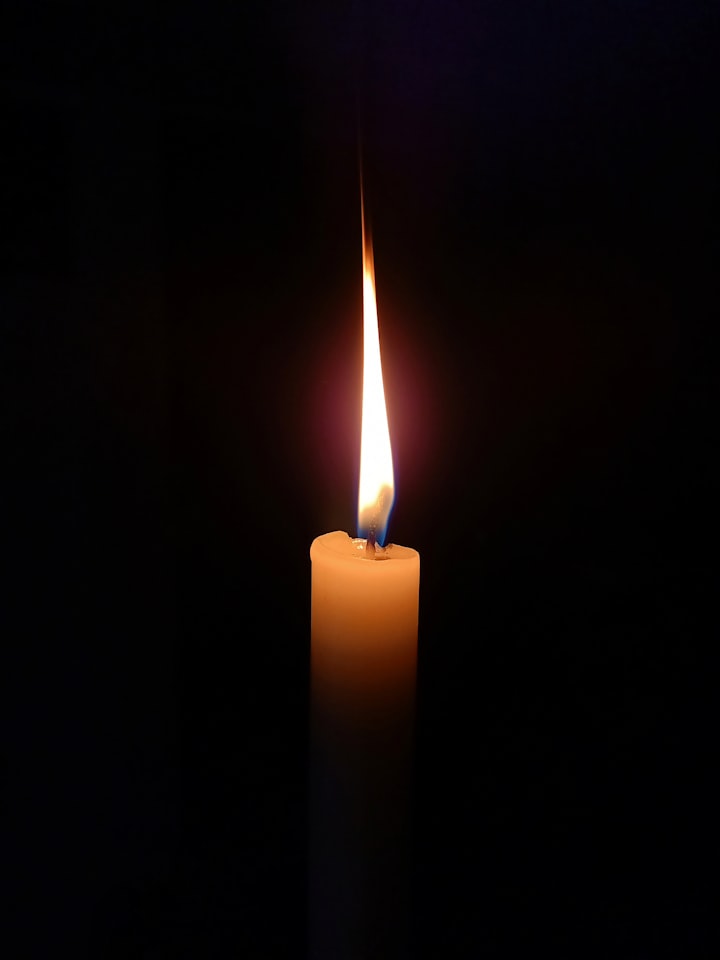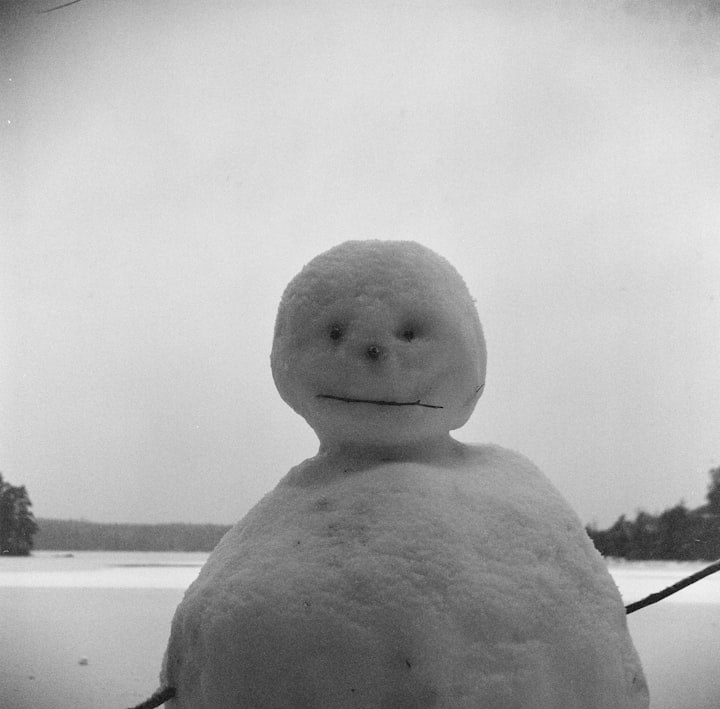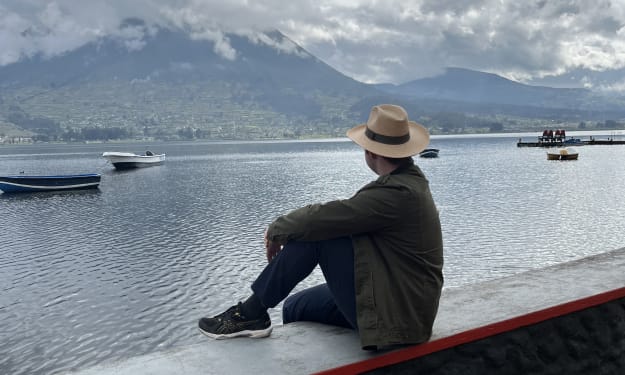
When the reckoning had come, it had come more swiftly and more absolutely than any of us had imagined. The plague had howled through the township like a hurricane, ripping mothers and fathers from their beds to clasp the hands of sleepy children and plunge them out into the night, soft eared rabbits and bears clutched to their pyjamad chests, bare feet pounding at the pavements, softness toughening or yielding in a few short moments. We grow up fast in a disaster. Or we die.
No one escaped, but those of us who had believed in the worst, those of us who had begun to prepare, made it into the Keep alive. Some simply sat on rockers on porches in the dark and let it take them, some kept running and died in the throes of desperation. Many waited, disbelieving, at the bus stop or on the steps of the small town hall where Muslims, Jews and Christians took their turns to worship each week, expecting a voice of authority to tell them what to do. I passed their pustulated bodies as I ran, and did not stop. I did not want to see.
Now, in the total dark of the Keep, I see nothing else. The blue stare of Mary, the store clerk, those eyes of summer sky fixed on mine from between blistered, angry lids. Dead, surely, I thought, until I saw those lids blink, the paralysis not yet complete. Then I see again the sprawled forms of the Mahmouds; father, mother, and three boys strung along the playground’s edge, the first to fall pointing the way forward for the next, and the next, until the last, tiny Nuri, not even four feet tall, splayed like a star atop its shooting trail. Worst of all, I see my brother, Jacob, his face still clean and smooth, framed by the curtains of our upstairs window, watching me run.
Jacob had laughed at me at first, mocked my concern at what he viewed as crackpot scaremongering and conspiracy theories. “We might be wrong” I told him, “I hope we are. But if we’re not?” Before long his scorn laced not just our conversations about the plague I knew would come, but our every exchange.
“It makes no rational sense” he told me.
“I know” I said “not to your mind, or mine. But there are larger forces at work. Please, just be ready. In case I’m right.” He was all the family I had left since our parents died.
The last word I had said to him was please. But he chose to stay, incredulous to the last. It would have come slower to him, behind his window, beneath his roof. But it would have come. It will come to all of us.
Twenty three of us made it in before the great steel door was clanged shut, snuffing out the last sliver of moonlight. Twenty three people, seven torches, nineteen blankets and one key. In the beam of one torch, we counted our number, twenty three huddled souls of the forty who had helped prepare, and in silence, turned into the tunnel and walked away from the world.
The Keep had just been The Cave when I was a boy. Our mothers told us to stay away, but as children we crept in on summer afternoons to feel the chill dread of the dark, egging each other on, testing the limits of our bravado, and as teenagers we came again, armed with drift wood and matches and beer, afraid of nothing, and of everything all at once.
Everyone was afraid now, all of the time. That spark of adventure had seeped away into the rock walls and left only fear and desolation. The darkness was thick with them both.
The first night had been long and hard. Three times we heard the clang of fists on steel echoing down the tunnel and into the cavern as we sat, huddled, around the light of one torch. Three times we looked to the stone floor, the vanishing emptiness above the torchlight, the frayed hems of our own sleeves, anywhere but at each other, and stayed silent.
When the blisters started to appear, we debated what to do. Quarantine the sick? Kick them out? Friendships forged over common concerns in the months before stretched as new alliances formed, broke and reformed. But finally looking at each other, we saw no one to be saved. Small boil like spots were breaking out on every bloodless face, each of us recognising the horror in one another’s eyes, casting our hearts into despair. We turned off the torch then and held hands in the dark, each of us granted some dignity behind the veil of black, and we waited together to die, knowing death had come quickly to all who had been exposed. I thought of Jacob, and wondered if he was alone. I wondered if he would even care that he had been right, in a way. It seemed that it had all been for nothing.
After the rumours had started, that there would come a plague that would rid the earth of all mankind, Logan, who owned the land beneath which the cave lay, had a door built over the cave’s mouth, and shelves and mattresses moved into the cavern, carried through the tunnel by those of us who believed in making ready. Over the months we filled those shelves with bottles, tins and jars, with blankets and candles and medicine. We piled firewood and cooking pots against one wall, and behind an old screen, stacked bucket toilets. We argued over which albums to bring for the battery operated CD player Steph had unearthed in her basement. Across the new steel door we painted the words “The Keep”, like a clubhouse castle we might defend with wooden swords. Perhaps we thought about survival as a project, like building a tree house, but it’s hard to truly contemplate death as you make ready to cheat it.
But that first night, death danced a capricious reel. I felt, with a lurch of horror, the hand on my left grow slack and then slowly, slowly cold, before I let go only as the fingers stiffened around mine. But to my right, the hand in mine stayed warm and smooth, squeezing every now and then, waiting for my response, then squeezing again. The night passed slowly. Eventually, long after my legs had grown numb, and outside, the sun had likely risen on a world ended and made anew, Logan turned the torch back on. Nineteen of us remained, the pustules crusting over on our squinting faces. “One blanket each then”, said Lloyd, and no one laughed.
We rationed the torches, of course, alongside the food, the water and the firewood, but we had never really thought about how long we might be down here. Days turned to weeks, weeks to one month, two, we lost track of night and day quickly in the perennial starless dark. We learnt the layout of the cave by feel, learnt to shuffle our feet to avoid standing on one another. We learnt how touch quieted the disorientated fear of waking up in the pitch black, and how to slow our hearts with our breath. Periodically, we lit a fire, then gathered to cook a warm meal, tidy what was disarrayed and write the journal we thought might one day be found. But those days could not last. As the wood dwindled, we spoke of venturing back out, Esther volunteering herself, whether out of desperation or altruism no one knew. She promised us that she would return if she could. We waited by the door in shifts, but she never came back. Logan took the key from the door and hurled it against the wall in temper when we called off the watch. We heard the metallic ring of metal on rock, but even with the help of a precious candle, we found nothing.
“They’ll cut through, when they come.” Said Ayesha. “They’ll have tools, they’ll cut through the door.” I thought of the bodies on the steps to the town hall.
The last fire burned just long enough to see the blisters return on the first of us to fall sick again. Lina, alone since her husband had died in the pandemic before, was a story teller, her voice weaving pictures we could all see in that sightless world, like she had five years of love and living stored up waiting to spill out. But as those final embers cooled from red to a glowing grey, to black, we listened only to her pain, as she whimpered and cried out in the darkness. None of us had expected this, this resurgence. “Does it hurt very much?” asked Joanie.
“I’m just so scared” Lina cried. “I don’t want to die in the dark!”
We lit a candle, then, and placed it near her head, each of us drawing close to sit in its light, drawing back in fear at what might await us, forming a halo around the dying woman. The vigil gave way to the practicalities of light in the dark. Mitchell and Colm took inventory in the gloom, Sarah sat close, writing all of our fear in her neat, slanting hand. I only watched, as the stillness came slowly to Lina’s body, belied by the seething blisters above numbed nerves. I thought again of Mary’s eyes as Lina’s, dark in the softness of candle light, came to rest on mine, and I saw my own fear reflected back at me. It took her 8 hours to die, the first measure of time we had had since Tom’s watch battery had run out a long time before. 8 hours. The time each candle was meant to burn for. I don’t think she felt much pain.
“We have 814 cans left, fruit, beans, meat and vegetables” said Mitchell. “Nearly 600 litres of water. Hardly any toilet space. If you need to pee, go up the tunnel a bit, shit only in the buckets now. We have fourteen lighters, but we have only sixteen candles. No fire wood. No working torches.”
“One of us has to die in the dark then.” Lloyds voice met a solitary laugh this time, chaotic, hysterical, echoing in the pitch black. I thought it sounded like Joanie, but I wasn’t sure.
Lina proved to be the first to go. We had thought perhaps our low dose exposure, each of us covering our noses and mouths as we ran from our homes with the masks we had ordered months before, had been enough to make us sick but not to kill us, but whether the pathogens nestled deep in our cells waiting to re-emerge, or whether the air was slowly seeping in from outside until the dose reached a critical level, it was hard to know. Colm was next, probably only days later. Steph was the first to notice, reaching out her hand to touch his cheek when he woke screaming into the nightmarish dark. She said nothing, but Colm felt her fingers recoil and reached his own to his face, screaming again, just once, as he felt the blistered skin on his cheek.
Mitchell lit the candle, but we clung to the walls, afraid of meeting our own fates if we drew closer. Colm lay alone, bathed in light, while tears pooled beneath is head, and eight hours burnt away.
After that, no one wanted to be touched, or to touch another. We rested hands on sleeved arms and fabric covered legs, but steered away from faces, silently, privately, obsessively stroking our own. Marcus came next, his voice clear as a bell in the blackness. “I’m sorry guys. I’m going to need my candle.” This time, we drew close, none of us willing to remember how Colm had died alone. None of us wanting to stay outside the light. Michael sat close to the candle, passing black thread back and forth across a tear in his trouser, making a neat scar in the fabric. No one asked him why he was troubling himself. We all found something to do.
Ayesha lit her own candle, the sudden spark startling us all, a dreaded blessing of light, relief at the piercing of the dark quickly engulfed by grief as we peered through the blooming flame to see who had sought the light. She lay on her mattress and spread her blanket across her body, placing the candle at her hip, and turning her face to the flame. It took her nine hours to die, and we held her now useless hands in our own and sang to her once the dark returned. We sang often after that. Reaching out with our voices.
Now there are only two voices, mingling in this chamber fringed with death. Mine and Sarah’s. Two voices, and one candle. Food for another month, water too. But just one candle. We have pushed our mattresses together, by the shelves, and we have lain here in the dark, hand and hand, singing and in silence, for who can say how long. The last candle lays behind us on the shelf, the lighter ready, and we go on singing, and talking, and holding hands.
I am ready to die now, rather than live another moment of this, but Sarah is not. “You have to keep hope,” she says, “nothing is inevitable.”
“Death.” I reply. “Death is inevitable.”
“Yes, but not now, not in this next minute. Maybe not in the next year, or two years or ten. Maybe someone will come. Maybe, if we keep singing, maybe someone will hear us, and come. We’re not dead yet.” I know that she’s wrong, but what would be the point in saying so.
“What would you do?” I ask, when the silence feels too long. “If we got out, I mean, if the plague was gone, if we could start afresh.”
“Survive.”
“I’d been thinking I’d like to swim in one of those pools where you can’t see where the pool stops and the sea begins.” I laugh to myself. Who’s the realist now?
“If we could go back though,” she’s wandering now, out past the present and into what has gone, “I’d go see my Grandma. I’d sit on my Grandma’s porch and I’d sip my Grandma’s lemonade and I’d kick my heels against the floorboards and I’d watch the sun. I’d get out there before she came up, and I’d watch her rise way out to my left and sink again all the way over on my right, and in between I would look at every single thing in my Grandma’s garden, and just take it all in.”
“I’d climb up the mountain” I offer. “Me and my brother Jacob, and my mum and my dad, we used to go up the mountain at least once every summer. We’d pack a lunch, and it didn’t matter what time we got to the top, that was lunch time. We would just sit up there, eating sandwiches, and looking at the view. I’d go up there again, just the four of us. Maybe you could come too, if you wanted.” I turn my face toward Sarah. Maybe she turns hers to me, but when I hear her speak again, it doesn’t sound that way.
“Do you think there’s anyone left out there?” She sounds small now, back in the present.
“I’m sure of it.”
“Truly?”
“Sure of it.”
I am, but it makes no difference to us. Somewhere, people had done this better. Bunkers with generators and communications, maybe with windows and sunlit gardens. Maybe people were out, in air filtered suits or sealed vehicles. If we have come this far on amateur paranoia, there are others out there doing better than us. Others who are going to make it. But not us. I am ready to die, but Sarah, still, is not. And I don’t know what fills my heart with more dread, being last, or leaving her to die alone in the dark.
“Sarah?”
“Yes?”
“Just. Dunno.”
“Want to sing?”
“Yes.”
Sarah’s voice is beautiful, whole in the pitch black eternal night, and mine sits beneath, like a stage to raise hers up. Perhaps, in this moment, this is the best song I have ever heard. But it is getting harder to sing.
She squeezes my hand and I can feel the need in it, but I don’t squeeze back.
“If I go first” I say, putting all my effort into keeping my voice steady, “I want you to have the candle.”
“We’re not going to die here.” Desperation caught in a pretence of confidence.
“Ok. So it won’t make a difference if you promise then.”
“We are not going to die here.”
“Please Sarah. I just… let me feel ok about this, please?” The pause is too long. “Sar?”
“Well, just don’t die then, let’s agree on that.”
“I’ll do my best” I answer, though I can’t form the B quite as I should.
I hear her turn towards me now, though I can no longer feel her hand in mine, nor her fingers on my face. But I hear her pull herself to sit, I hear her rummage behind me.
“Sar o…” I try.
The lighter sparks in the dark, and I watch the wick catch, that tiny orange beacon stretching and settling atop the candle, punching a space in the blackness. I see, for the first time in days, maybe weeks. In the periphery of my vision, mounded blankets surround us, the bodies of our brethren. Above me, crates of tins, the supplies that outlasted us, sit neatly on wooden shelves, and above that, the darkness glowers, ready to plunge back in. My eyes come to rest on Sarah, her face smooth, angelic in the candle light. We lock eyes, and I plead with all my will.
“It’s ok” she says. “It’s ok, I’m still here.”
*
Written for Randy Baker's March Challenge, below:
About the Creator
Enjoyed the story? Support the Creator.
Subscribe for free to receive all their stories in your feed. You could also pledge your support or give them a one-off tip, letting them know you appreciate their work.
Reader insights
Outstanding
Excellent work. Looking forward to reading more!
Top insights
Compelling and original writing
Creative use of language & vocab
Easy to read and follow
Well-structured & engaging content
Excellent storytelling
Original narrative & well developed characters
On-point and relevant
Writing reflected the title & theme
Masterful proofreading
Zero grammar & spelling mistakes






Comments (12)
Heavy, intense, and almost familiar in the wake of Covid. This was a brilliant read Hannah! "Three times we looked to the stone floor, the vanishing emptiness above the torchlight, the frayed hems of our own sleeves, anywhere but at each other, and stayed silent." Fantastic paragraph this one, and the contrast of noise against silence is great. "Sarah’s voice is beautiful, whole in the pitch black eternal night, and mine sits beneath, like a stage to raise hers up. " The dwindling of both lives and light as the story goes on was hard to read, yet so well-written. You nailed this!! :)
This is truly, truly awful. Best thing I've read in AGES! How is it not a top story, I'll never know.
Great writing, very dark and sad. Congratulations on the win.
Congratulations on the Win! Excellent story, Hannah!
For me, this was a walk into the worst nightmare. I can't imagine (thankfully you did it for me) what it would be like. I would still be searching for that key, lol. Excellent story, Hannah!
Wonderfully written… as always. From ‘ But that first night, death danced a capricious reel.’ to the two of them ages later. It was beautiful how their focus changed from self preservation to caring and compassion.
Hahahahahhaha Llyod was my favourite! I loved how dark, intense and tragic your story was!
Powerfully poignant. An incredibly beautiful & tragic tale.
God, I couldn’t stop reading. This was absolutely phenomenal. Strong work Hannah. I loved this.
I concur with DK & DJ. This is absolutely riveting, edge of the seat storytelling, and relevant as well. If you don’t mind me asking, how long did it take you to write this?
Absolutely enthralling! I’d point out a strength or striking part but it was just relentlessly good from start to finish
A powerfully frightening and plausible tale, for our time and all times touched by plague.